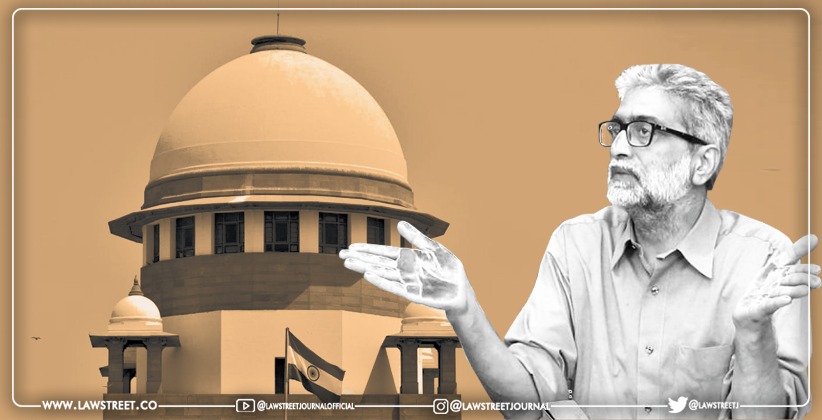A petition has been filed by activist Gautam Navlakha challenging the Bombay High Courtjudgment which rejected his plea that he should be granted default bail by computing his 34-day period of house arrest in 2018. A division bench comprising Justices UU Lalit and KM Joseph of the Supreme Court on Monday said that it will hear on March 22(Monday). The hearing has been adjourned on Monday at the request of the National Investigation Agency for filing a counter affidavit to Navlakha's plea.
It is only a question of law whether the house-arrest period is to be included for the purposes of Section 167 CrPC, Justice Lalit added directing the NIA to file the counter-affidavit by March 19.
Though Senior Advocate Kapil Sibal, appearing for Navlakha, submitted that a counter-affidavit may not be necessary as the matter involves only a question of law, the bench accepted the request made by Additional Solicitor General S V Raju for time to file counter-affidavit.
Because the man is under custody, you have to expedite the process. We will have it next Monday, Justice Lalit told the ASG.
BOMBAY HC JUDGMENT:
The Bombay High Court on 8th February had held that the 34-day house arrest of Navlakha cannot be included for computing the period for filing chargesheet for the purposes of default bail.
The court noted that the period of house arrest was held to be unlawful custody by the Delhi High Court on account of breach of mandatory conditions for arrest and remand but such period of unlawful custody cannot be included while computing the 90 days period prescribed for grant of default bail under Section 167(2) of the Criminal Procedure Code (CrPC).
The court held that there was no doubt Navlakha was under house arrest, during which time he could interact only with his family and lawyers. However, the investigating agency did not have any access to him or an occasion to interrogate him, as the High Court had ordered the police to keep Navlakha at the same place from where he was picked up.
However, once the authorisation by the Magistrate is declared illegal consequently rendering the detention itself illegal, the said period (house arrest custody) cannot be construed to be an authorised custody within the meaning of Section 167(2) of CrPC, the court said.
Further, the decision in the case titled Chaganti Satyanarayan and others v State of Andhra Pradesh was relied on by HC where the Supreme Court held that:
the period of 90 days or 60 days, as the case may be, will commence running only from the date of remand and not from any anterior date in spite of the fact that the accused may have been taken into custody earlier by a police officer and deprived of his liberty
Thus in the light of our discussion and conclusions reached we do not find merit or force in the contention of the appellants' counsel that the words 'for a term not exceeding 15 days in the whole" occurring in sub-section (2) of Section 167 should be so construed as to include also the period of custody of the accused from the time of arrest till the time of production before the Magistrate. A Magistrate can, therefore, authorise the detention of the accused for a maximum period of 15 days from the date of remand and place the accused either in police custody or in judicial custody during the period of 15 days' remand. It has, however, to be borne in mind that if an accused is remanded to police custody the maximum period during which he can be placed in police custody s only 15 days. Beyond that period no Magistrate can authorise the detention of the accused in police custody, the HC ruled.
The HC bench was led by Justice SS Shinde.








